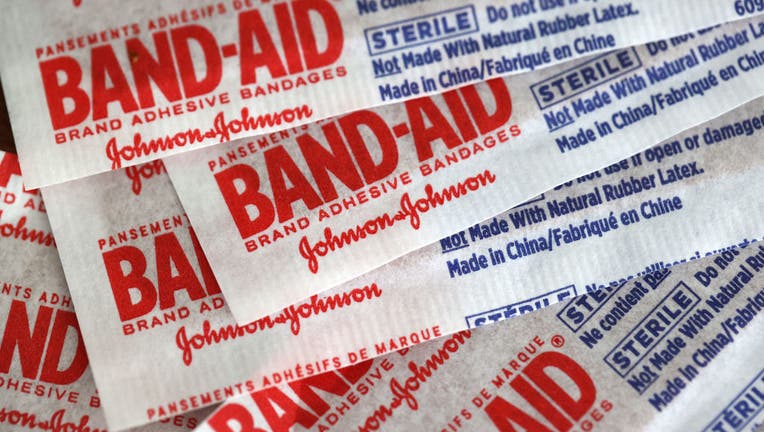Study finds 'forever chemicals' including PFAS in popular bandage brands

FILE - In this photo illustration Johnson & Johnson band-aids are displayed on a table.
LOS ANGELES - A recent consumer study conducted by Mamavation and Environmental Health News has found that well-known bandage brands like Band-Aid and Curad may contain concerning levels of PFAS, also known as "forever chemicals."
Out of 40 bandages tested from 18 different brands, 26 were found to have organic fluorine, indicating the presence of PFAS. This discovery raises important questions about the safety of these commonly used products.
"Because bandages are placed upon open wounds, it’s troubling to learn that they may be also exposing children and adults to PFAS," said Dr. Linda S. Birnbaum, the study’s co-author and the former director of the National Institute of Environmental Health Sciences and National Toxicology Program.
According to the study, the chemicals were detected in the adhesive component of the bandages. Mamavation suggested that certain brands might have incorporated PFAS into their bandages "for their waterproof qualities."
What are "forever chemicals?"
Microplastics, often termed "forever chemicals," are plastic fragments smaller than 5 millimeters, while nanoplastics are even smaller, measuring less than 1 micrometer. In essence, they are minuscule plastic particles that are difficult to detect without magnification.
The recent study uncovering microplastics in well-known bandage brands marks merely one of a series of revelations concerning the harmful substances present in everyday items that people use and consume regularly.
These microplastics aren't confined to bandages or food packaging; regrettably, they permeate nearly every facet of our daily lives.

What are microplastics?
Microplastics are pieces of plastic that measure less than 5 millimeters and these tiny particles are finding their way into our drinking water, food, and even our blood.
A separate study published last year revealed that commonplace consumer goods like shower curtains, car upholstery, lunch boxes, and shoes harbor chemicals that have been linked to the proliferation of uterine tumors called fibroids.
READ MORE: Study: Consumer products containing phthalates increase risk of uterine tumor growth
In 2023, dozens of companies involved in food packaging received pressure after the toxic industrial compound PFAS was detected in fast-food wrappers, boxes and plates that consumers interact with on a daily basis, the Associated Press previously reported
Environmental and health groups have pushed dozens of fast food companies, supermarket chains and other retail outlets to remove PFAS chemicals from their packaging.

